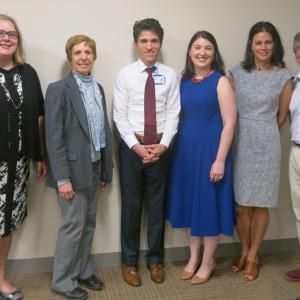
The Duke Center for Applied Genomics and Precision Medicine’s (CAGPM) Post-doctoral Training Program in Genomic Medicine, supported by an NIH training award (T32), began in 2017 with its first two fellows: Carolyn Baloh, M.D., and Cory Stingl, M.D. Now that their time in the program is coming to an end, they are reflecting on their experiences and looking towards their futures.
Carolyn Baloh
It has been a pleasure and a privilege to be a post-doctoral fellow in the Genomic Medicine Research Program. It has provided me with mentors in clinical genomics, genomic research, computational genomics, cancer genomics, and immunology. With this extensive group of people to guide my training and research, I am well-poised to tackle the difficult phenotypic and genomic questions that arise with patients with common variable immune deficiency (CVID).
I have particularly enjoyed our monthly Ethical Legal and Social Implications (ELSI) of Genomic Science and Medicine Point/Counterpoint series where I have learned about many issues/controversies in performing genomic research. Examples include genomic research in vulnerable populations, informed consent, return of clinical and research results, engaging the community in genomic research, and maintaining privacy of genomic data. These lessons will inform how I engage with research participants and design future research projects.
Participating in this training program has allowed me to strengthen my writing skills though participation in seminars including Writing Winning Grant Proposals and Writing from the Readers Perspective. I have already implemented lessons from these seminars in my publication and grant writing. They were invaluable experiences to increase my ability to have publications and grants accepted/awarded.
I have also been exposed to additional components of genomic research, that I have not had the opportunity to learn as part of my research work. These have included GCB academy courses, in particular An Overview of Risk Prediction and Classification in Omics Settings and the GCB Data Carpentry for Genomics courses. These have provided me with an expanded view of ‘omics and ideas for future research directions. They have also improved my communication with colleagues using techniques discussed in these sessions.
The goal of my research during this fellowship and in my overall career is to better characterize clinical phenotypes of CVID, connect those phenotypes to the genotype, and then improve therapy for our patients. I have performed multiple studies of clinical phenotypes of CVID, including studies of risk factors for poor outcomes in those with disease onset at a pediatric age; for cancer development regardless of age at disease onset; and for issues with fertility, pregnancy, and descendants. I have also received my first independent research grant to study the development of low bone density and osteoporosis in CVID.
With regard to genetics, I have been part of a team performing whole exome sequencing with a targeted panel on a cohort of over 200 CVID patients. It will be the first study confirming the inheritance of CVID and its polygenic origins. I was honored to have received the best poster award at the National Human Genome Research Institute (NHGRI) Research Training and Career Development Annual meeting in 2018 for this work and to have been able to present the updated work as a platform presentation at the same conference the following year. I have also been developing a humanized mouse model of CVID, but progress is now slow due to limitations in the field at large. I have begun work on validating a novel gene that has the potential to be the most common cause of CVID.
Additional honors that I have received related to my research have included acceptance to the Clinical Immunology Society Summer School 2018 and to the American Academy of Allergy, Asthma, and Immunology (AAAAI) Faculty Development Program 2019.
I will be staying at Duke as an Advanced Research Fellow for another year to complete my work and plan to join Duke faculty at the completion of that year. I intend to submit an application for a K grant within the next year.
Cory Stingl
As I reflect on my time during the last two years of Duke’s post-doctoral training program in genomic medicine, I remain grateful for the educational opportunity and mentorship I received during the program. Even though medical doctors spend at least seven years in training between medical school and residency, most will not receive sufficient training in research methodology to conduct medical research alongside their clinical practice. For those of us who do not come into medicine knowing we want to do research, even fewer options are available to obtain this skillset. Post-doctoral training programs are therefore critically important avenues for teaching research methodologies to clinicians who want to make research a components of their career.
For me, this program was the entry point to learn how to obtain and analyze gene expression data and use this information to understand how it could potentially influence my clinical practice in the future. My hope is that this training gives me another set of tools to better guide how we treat children with pediatric rheumatic diseases. In addition, these two years have taught me a lot about the research process, helped me form life-long relationships with others in my field and taught me to think more critically about our limitations in my field, pediatric rheumatology.
I will be staying at Duke as one our pediatric rheumatologists.